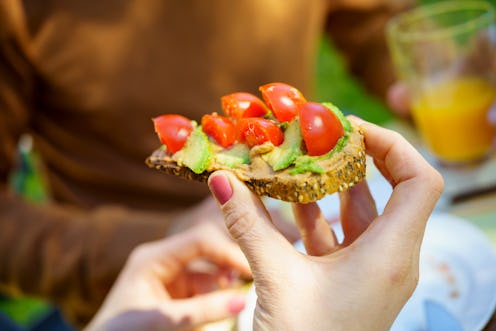Food
Science Says You Can Actually Be Allergic To Avocado
Feeling betrayed, TBH.

Unfortunately, sometimes your most-beloved foods can turn against you. If you're histamine intolerant, and you feel blah after eating your avocado toast, it's worth exploring whether or not you could be allergic to avocado. Yes, you read that right. Sadly, in addition to allergies to coffee and other foods and drinks, some people can also be allergic to avocado. How can this be? Avocado is an all-natch super food; why would anyone's body treat this luscious green treat as an invader? It turns out that avocados are high in histamine, which is one of the main culprits of many common allergies.
If you develop gastrointestinal issues after eating avocados, and you've eliminated the usual suspects from your diet (like dairy and gluten), avocados could be causing your discomfort. Of all the things that can cause allergies, who knew that histamine was hiding in one of life's last simple pleasures? "Histamines are natural signaling chemicals that our bodies produce and use for all sorts of purposes. They play a role in the release of stomach acid and produce the swelling and inflammation essential to our immune system's ability to heal infections," registered dietician Tamara Duker Freuman wrote for U.S. News & World Report.
While this makes it sound like histamine is your BFF, sometimes everyone needs a break from their bestie. "So what happens if someone — particularly someone whose histamine levels already run high as the result of seasonal or environmental allergies — starts eating lots of high-histamine foods?" Freuman asked.
You've probably already guessed the answer, but I'll tell you anyway. Seasonal and environmental allergies coupled with high-histamine foods can make you feel icky. "In some cases, [you] may experience an inflammatory reaction within the digestive system that produces symptoms very similar to IBS and GERD: chest tightening, heartburn, bloating and/or sudden onset diarrhea," Freuman explained. "Typically, the symptoms kick in within minutes of eating an offending food. This is called histamine intolerance."
What's more, if you're not histamine intolerant and breathing a huge sigh of relief, I have more bad news. If you're allergic to latex you can also have an allergic reaction to avocado because of cross reactivity, which means you could be reacting to an avocado that has been handled by someone wearing latex gloves, according to Healthline.
"Symptoms of latex-avocado allergy include swelling of the lips, sneezing, itchy eyes, and stomach discomfort, including vomiting. You also could have systemic reactions, including hives, and anaphylactic response, like swelling of the airways and difficulty breathing," Healthline reported. However, in this situation, you might be able to avoid having an allergic reaction by washing your fruit thoroughly and choosing organic avocados. This means avoiding eating avocados in restaurants, but the good news is that you won't have to shun avocados altogether.
If you are allergic to avocado, you'll have to do some detective work to ensure that it's not present in any of the prepared food you're eating. Kind of like dairy and sugar, avocado can show up in a lot of places you wouldn't expect. According to Healthline, avocado is used in a lot of vegan and paleo recipes, it's a popular ingredient in many baked goods, and is often used as a butter substitute in some recipes.
And, if you're allergic to avocado, you might be allergic to other high-histamine foods like spinach, tomatoes (including ketchup and marinara sauce), pumpkin, eggplant, soy foods, brewer's yeast, and red kidney beans, Freuman reported. Unfortunately, there's more to cross off your list. "Avoid fermented, cured, or cultured foods: wine, beer, aged cheese, smoked fish, salami/prosciutto/pepperoni, kimchi, sauerkraut, kombucha, miso, tofu, soy sauce, yogurt, and kefir."
Spices and sulfites present in some foods can also trigger a reaction. If you are histamine intolerant, Heathline has a low-histamine foods guide that can help you make safe choices. That being said, food isn't the only place you can find avocado. Your bae-turned frenemy can also be present in some non-food products like makeup, shampoos, and moisturizers. If you've had any of the symptoms associated with histamine intolerance, check with your doctor to see if something else could be causing it before breaking up with avocados for good. #TheMoreYouKnow
This article was originally published on